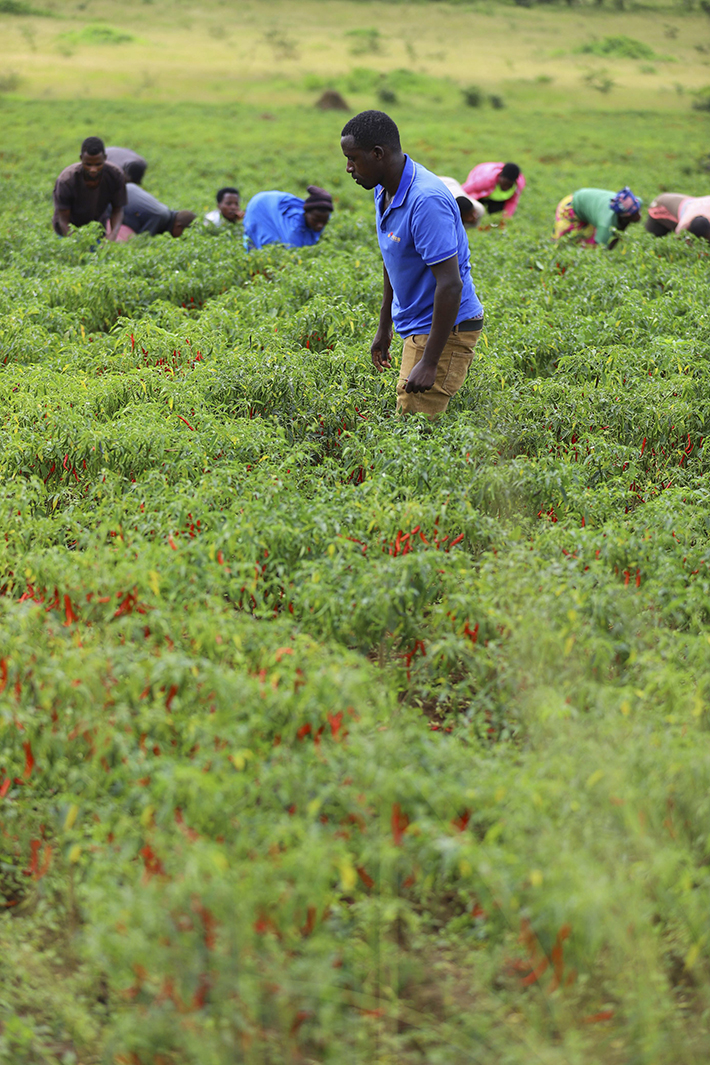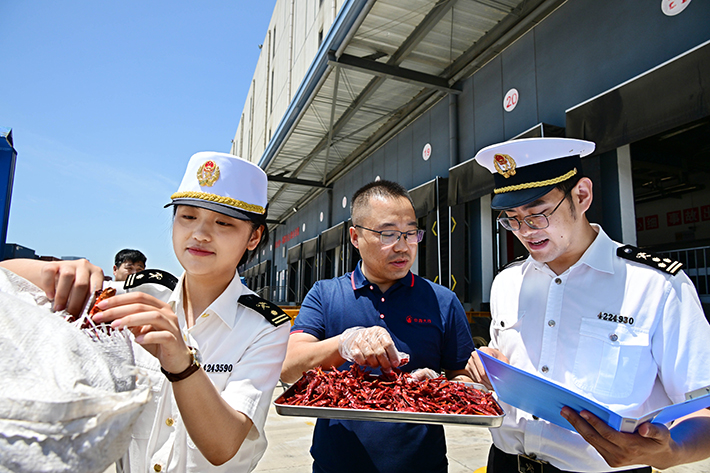|
||||||||||
| Home Top News Economy/Tech Culture/Sports China in Foreign Eyes Green Development Videos Intangible Cultural Heritages |
|
||||||||||
| Home Top News Economy/Tech Culture/Sports China in Foreign Eyes Green Development Videos Intangible Cultural Heritages |
| ChinAfrica |
| Fiery Spark |
| Chilli exports to China are transforming farmer’s socio-economic status |
| By Derrick Silimina | VOL. 17 October 2025 ·2025-10-10 |

Employees of a farm work in a chilli pepper field in Rwanda on 22 May (XINHUA)
As the morning sun casts its glow over the lush rolling hills of Nyagatare District, chilli farming is spicing up cross-continental trade and bringing tangible benefits to local farmers in Rwanda. “I can now afford to pay school fees for my children, and meet other financial needs at home, a tangible benefit of chilli farming compared to other commercial crops,” Noel Nzabamwita told ChinAfrica.
Nzabamwita, a 46-year-old member of the Ejo Heza cooperative who transitioned from tea to chilli cultivation, demonstrates how integrating traditional agricultural resilience with modern agribusiness practices can transform one’s socio-economic status.
This shift aligns with Rwanda’s export strategy of enhancing agricultural productivity. The strategy has significantly contributed to an agricultural revolution driven by strategic partnerships and the dedication of local chilli farmers such as Nzabamwita. This approach underpins the country’s broader economic growth, highlighting the importance of strengthening agricultural sectors and fostering collaborations to boost exports in the east African country.
Strategic shift
“Chilli farming has been a game-changer for me. I have even managed to build a house thanks to the lucrative chilli market - something I couldn’t afford with my previous crop production,” Nzabamwita said.
Gashora Farm PLC, a prominent Rwandan agribusiness, plays a key role in supporting smallholder farmers like Nzabamwita with essential services, including technical assistance, inputs, access to finance, and guaranteed markets. These measures help to integrate small-scale farmers into the export value chain while reducing their risks.
“My entrepreneurial journey began after completing school, when I managed ventures such as organising events and selling music devices. Later, I transitioned to establishing a small chilli farm,” Gashora Farm Managing Director Dieudonne Twahirwa said recently.
Twahirwa’s agribusiness began with small-scale production of tomatoes and watermelons aimed at earning quick cash. However, he faced challenges in achieving stable income from these ventures. After attending an agricultural show in Kigali in 2015, he shifted his focus to the international market, recognising opportunities for better contracts and greater stability for chilli farmers.
This strategic move marked a significant turning point in Gashora Farm’s development, underscoring the importance of export markets for sustainable rural development. Since the first China-Africa Economic and Trade Expo in 2019, enterprises in China’s Hunan Province have reached preliminary agreements with their Rwandan counterparts to purchase dried chillies, following Rwanda’s export application of dried chillies to China.
In 2021, Twahirwa successfully entered the Chinese market, following entry to Europe and India. Recognising the immense potential of China’s market, Rwanda, through Gashora Farm, achieved a historic milestone by exporting dried chillies to Hunan. This landmark achievement made Rwanda the first African country to send dried chillies to China, highlighting the strategic significance of diversifying export markets.

A customer selects chilli sauce made from Rwandan chilli peppers at a convenience store in Changsha, Hunan Province, on 6 June (XINHUA)
Chinese buyers favour Rwandan chilli for its competitive prices, organic quality, and high standards. In 2024, this advantage prompted Gashora Farm to partner with Hunan Modern Agriculture International Development Co., a subsidiary of Hunan Cereals, Oils and Foodstuffs Import and Export Group Corp. Ltd., to launch the Rwanda-Hunan Chilli Pepper Industry Demonstration Project. The project’s success was supported by Rwanda’s favourable climate, low labour costs and efficient government services, which together facilitated its growth and strengthened bilateral agricultural cooperation.
The transformation into agriculture, specifically through the chilli farming venture, is supported by Gashora Farm and the Rwanda-Hunan Chilli Pepper Industry Demonstration Project, an initiative that works closely with thousands of out-grower farmers, including upcoming agro-entrepreneurs like Albert Hagirimana, by utilising a comprehensive contract farming model over an area of 100 hectares. “The initiative has empowered me with easy access to inputs and a ready market, which helps to ensure the sustainability of my chilli production with greater ease,” Hagirimana explained.
Exemplified by the first season, during which 200 tonnes of dried chilli were exported to China, this milestone has generated optimism among local farmers about Rwanda’s potential to expand and strengthen its agricultural industry.
“I currently employ 10 full-time workers and over 50 part-time workers during the harvesting season, demonstrating the initiative’s positive impact on job creation both directly and indirectly,” said Hagirimana.
For Gladys Habineza, working in the chilli farmlands has brought financial stability to her household, highlighting the socio-economic benefits of participating in the chilli out-grower value chain. Habineza, a mother of two who works as a pepper sifter at Hagirimana’s farm, affirmed, “My job has significantly improved my financial situation, enabling me to pay for groceries, clothing, and my children’s school fees.”

Customs officers inspect a shipment of dried Rwandan chilli peppers at a warehouse in Qingdao, Shandong Province, on 11 June (XINHUA)
China market demand
Arguably, the sector’s growth is underpinned by strong market demand, particularly from China, as well as robust support from both the Rwandan government and private stakeholders. This vibrant and expanding industry showcases the potential of chilli farmers and serves as a model for rural empowerment, driven by strategic international cooperation and innovation.
Trade experts contend that initiatives like this demonstrate how strengthening international ties can foster collaboration that benefits local farmers, enhances trade, and promotes cultural exchange across continents.
According to the UN Food and Agriculture Organisation, agriculture is Rwanda’s primary economic activity, engaging 70 percent of the population and employing around 72 percent of the workforce. The sector contributes approximately 33 percent of the national GDP.
James Kimonyo, Rwanda’s ambassador to China, recently noted that Chinese investments in the country have been steadily increasing, alongside significant growth in exports to China.
“We appreciate the continued support of the Chinese government, which has contributed to the rise in investments and the growth of our exports, particularly through initiatives such as the zero-tariff policy that opens the market to Rwandan and other African products,” Kimonyo said at the fourth China-Africa Economic Trade Expo held in June in Changsha, Hunan Province.
In 2023, Rwanda exported over 3,400 tonnes of chilli - fresh, dried, and processed - generating $4.2 million in revenue, according to data from the Ministry of Agriculture and Animal Resources of Rwanda.
Agriculture and Animal Resources Minister Ildephonse Musafiri recently stated that, based on this performance, the country aims to increase its chilli exports to more than 38,700 tonnes annually within the next six years, representing a more than ten-fold increase by 2030.
Trade analysts note that while China is a major producer of chilli peppers, it is also the world’s largest consumer, with a significant portion of the population enjoying spicy food - over 500 million people consume chilli-based dishes daily.
“We have a Chinese market that we can’t even satisfy as of today. So there is potential here to ramp up production,” Musafiri told delegates at the 2024 Africa Food Systems Forum in Kigali.
|
||||||||||||
| About Us | Contact Us | Advertise with Us | Subscribe |
| Copyright Beijing Review All rights reserved 京ICP备08005356号-5 京公网安备110102005860号 |